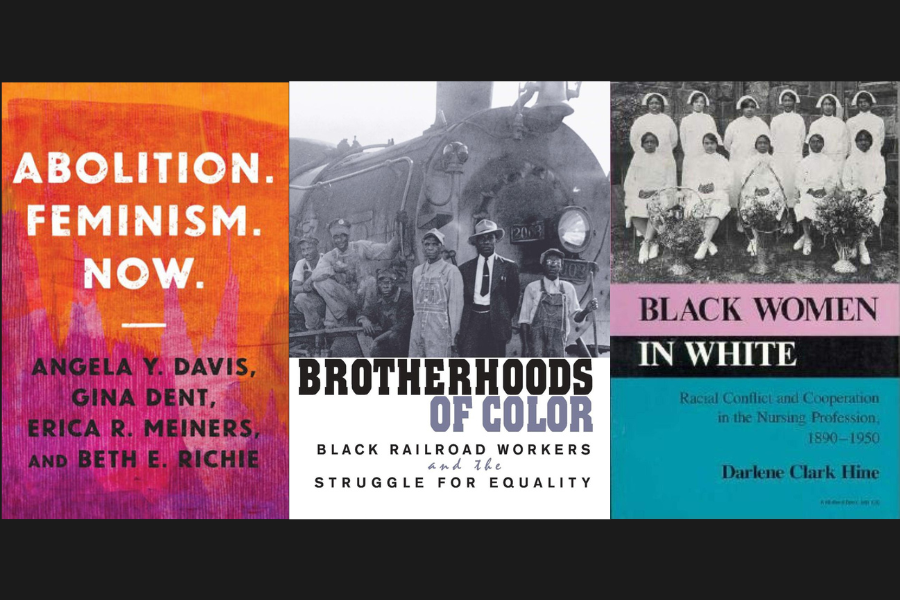“The 2025 Black History Month theme, African Americans and Labor, focuses on the various and profound ways that work and working of all kinds – free and unfree, skilled, and unskilled, vocational and voluntary – intersect with the collective experiences of Black people. Be it the tradition agricultural labor of enslaved Africans, debates among Black educators on the importance of vocational training, self-help strategies and entrepreneurship in Black communities, or organized labor’s role in fighting both economic and social injustice, Black people’s work has been transformational throughout the United States, Africa, and the Diaspora. The 2025 Black History Month theme, African Americans and Labor, sets out to highlight and celebrate the potent impact of this work.”
-Source: Association for the Study of African American Life and History (ASALH)
Below, you will find a selection of eBooks and electronic resources freely available through the University Library that explore the theme of “African Americans and Labor” with a spotlight on abolitionist narratives and scholarship. For even more books uplifting Black voices and experiences, be sure to visit our Black History Month book display in the library’s lobby on the First Floor. At the end of this blog post, you will also find information about Library events that uplift the perspectives, authorship, and creativity of the African American community.
Recommended eBooks
The Narrative of Sojourner Truth (1850) by Sojourner Truth
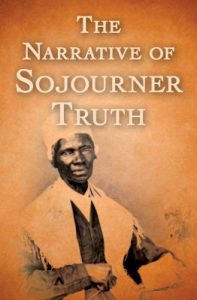 “Born into slavery in New York around 1797, then sold from master to master, Sojourner Truth spent her formative years witnessing the cruelty inherent in the institution of slavery. Escaping to a friendly household before emancipation, she learned that her young son had been sold illegally and launched a lawsuit that would end with his release—the first time in America that a black woman went to court against a white man and won. But Truth hadn’t even begun her work. She made it her life’s mission to free all those who were considered less than equal—both those in chains and those held down because of their gender—ultimately inspiring her friends and followers with the legendary speech that came to be known as “Ain’t I a Woman?” So great was Truth’s renown and respect that she met with President Abraham Lincoln in 1864.”
“Born into slavery in New York around 1797, then sold from master to master, Sojourner Truth spent her formative years witnessing the cruelty inherent in the institution of slavery. Escaping to a friendly household before emancipation, she learned that her young son had been sold illegally and launched a lawsuit that would end with his release—the first time in America that a black woman went to court against a white man and won. But Truth hadn’t even begun her work. She made it her life’s mission to free all those who were considered less than equal—both those in chains and those held down because of their gender—ultimately inspiring her friends and followers with the legendary speech that came to be known as “Ain’t I a Woman?” So great was Truth’s renown and respect that she met with President Abraham Lincoln in 1864.”
Autobiography of Frederick Douglass, Vol. 1 (1818-1895) by Frederick Douglas
 “Ossie Davis reads excerpts from Frederick Douglass’s autobiography, which traces the abolitionist and statesman’s life from early childhood through to his most significant political accomplishments. This first volume establishes the personal and educational foundation on which Douglass built his distinguished career, specifically addressing his birth into slavery, his battle to learn to read and how being forced to “drink the bitterest dregs of slavery” inspired his escape.”
“Ossie Davis reads excerpts from Frederick Douglass’s autobiography, which traces the abolitionist and statesman’s life from early childhood through to his most significant political accomplishments. This first volume establishes the personal and educational foundation on which Douglass built his distinguished career, specifically addressing his birth into slavery, his battle to learn to read and how being forced to “drink the bitterest dregs of slavery” inspired his escape.”
The Life of Olaudah Equiano (1789) by Olaudah Equiano
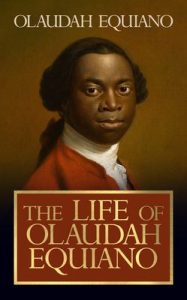 “A remarkable account of early slavery and later freedom,The Life of Olaudah Equiano, Or Gustavus Vassa, The African, Written By Himself, is the 1789 autobiography of former slave Olaudah Equiano. This memoir is a slave narrative, travel tale, and spiritual journey all-in-one. His life is a tale of terror as well as an exciting adventure. This fascinating account describes Equiano’s abduction from Africa at the age of ten and the years spent in labor on slave ships. It documents his attempts at becoming an independent man through his study of the Bible, and his eventual success in gaining his own freedom in 1766. What follows is success in business, in literacy, and a move to becoming an influential African advocate of abolishing the slave trade in Britain during the late 18th century.”
“A remarkable account of early slavery and later freedom,The Life of Olaudah Equiano, Or Gustavus Vassa, The African, Written By Himself, is the 1789 autobiography of former slave Olaudah Equiano. This memoir is a slave narrative, travel tale, and spiritual journey all-in-one. His life is a tale of terror as well as an exciting adventure. This fascinating account describes Equiano’s abduction from Africa at the age of ten and the years spent in labor on slave ships. It documents his attempts at becoming an independent man through his study of the Bible, and his eventual success in gaining his own freedom in 1766. What follows is success in business, in literacy, and a move to becoming an influential African advocate of abolishing the slave trade in Britain during the late 18th century.”
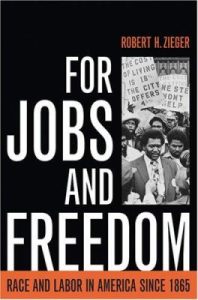
“Though racism and unfair hiring practices still exist today, motivated individuals and leaders of the labor movement in the nineteenth and twentieth centuries laid the groundwork for better working conditions and greater employment opportunities. Unions, with some sixteen million members currently in their ranks, continue to protect workers against discrimination in the expanding economy. For Jobs and Freedom is the first authoritative treatment of the race and labor movement in more than two decades, and Zieger’s comprehensive study will be standard reading on the subject for years to come.”
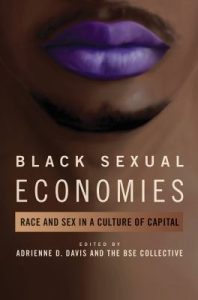 “A daring collaboration among scholars, Black Sexual Economies challenges thinking that sees black sexualities as a threat to normative ideas about sexuality, the family, and the nation. The essays highlight alternative and deviant gender and sexual identities, performances, and communities, and spotlights the sexual labor, sexual economy, and sexual agency to black social life. Throughout, the writers reveal the lives, everyday negotiations, and cultural or aesthetic interventions of black gender and sexual minorities while analyzing the systems and beliefs that structure the possibilities that exist for all black sexualities. They also confront the mechanisms of domination and subordination attached to the political and socioeconomic forces, cultural productions, and academic work that interact with the energies at the nexus of sexuality and race.”
“A daring collaboration among scholars, Black Sexual Economies challenges thinking that sees black sexualities as a threat to normative ideas about sexuality, the family, and the nation. The essays highlight alternative and deviant gender and sexual identities, performances, and communities, and spotlights the sexual labor, sexual economy, and sexual agency to black social life. Throughout, the writers reveal the lives, everyday negotiations, and cultural or aesthetic interventions of black gender and sexual minorities while analyzing the systems and beliefs that structure the possibilities that exist for all black sexualities. They also confront the mechanisms of domination and subordination attached to the political and socioeconomic forces, cultural productions, and academic work that interact with the energies at the nexus of sexuality and race.”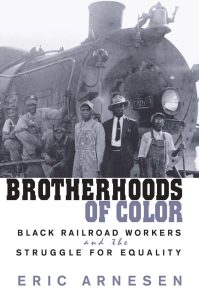 “Presenting the story of African Americans on the railroad during the 20th century, this text analyses the struggle against racism and job discrimination fought by the black railroaders, showing how the men forged their own brand of civil rights activism.
“Presenting the story of African Americans on the railroad during the 20th century, this text analyses the struggle against racism and job discrimination fought by the black railroaders, showing how the men forged their own brand of civil rights activism.From the time the first tracks were laid in the early nineteenth century, the railroad has occupied a crucial place in America’s historical imagination. Now, for the first time, Eric Arnesen gives us an untold piece of that vital American institution-the story of African Americans on the railroad. African Americans have been a part of the railroad from its inception, but today they are largely remembered as Pullman porters and track layers. The real history is far richer, a tale of endless struggle, perseverance, and partial victory. In a sweeping narrative, Arnesen re-creates the heroic efforts by black locomotive firemen, brakemen, porters, dining car waiters, and redcaps to fight a pervasive system of racism and job discrimination fostered by their employers, white co-workers, and the unions that legally represented them even while barring them from membership. Decades before the rise of the modern civil rights movement in the mid-1950’s, black railroaders forged their own brand of civil rights activism, organizing their own associations, challenging white trade unions, and pursuing legal redress through state and federal courts. In recapturing black railroaders’ voices, aspirations, and challenges, Arnesen helps to recast the history of black protest and American labor in the twentieth century.”
 “Here, Hine examines the professionalization of black nurses through institutional developments in hospitals, training schools, and nursing organizations. Comparing and contrasting this growth to white counterparts, she explores barriers of race and gender stereotyping. This well-researched and innovative historical study is an essential addition to North American medical history collections. ” – Library Journal
“Here, Hine examines the professionalization of black nurses through institutional developments in hospitals, training schools, and nursing organizations. Comparing and contrasting this growth to white counterparts, she explores barriers of race and gender stereotyping. This well-researched and innovative historical study is an essential addition to North American medical history collections. ” – Library Journal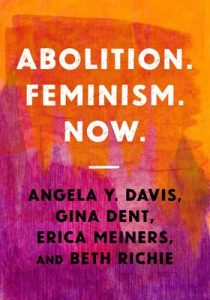
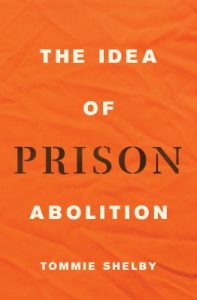 “In The Idea of Prison Abolition, Tommie Shelby examines the abolitionist case against prisons and its formidable challenge to would-be prison reformers. Philosophers have long theorized punishment and its justifications, but they haven’t paid enough attention to incarceration or its related problems in societies structured by racial and economic injustice. Taking up this urgent topic, Shelby argues that prisons, once reformed and under the right circumstances, can be legitimate and effective tools of crime control. Yet he draws on insights from black radicals and leading prison abolitionists, especially Angela Davis, to argue that we should dramatically decrease imprisonment and think beyond bars when responding to the problem of crime.”
“In The Idea of Prison Abolition, Tommie Shelby examines the abolitionist case against prisons and its formidable challenge to would-be prison reformers. Philosophers have long theorized punishment and its justifications, but they haven’t paid enough attention to incarceration or its related problems in societies structured by racial and economic injustice. Taking up this urgent topic, Shelby argues that prisons, once reformed and under the right circumstances, can be legitimate and effective tools of crime control. Yet he draws on insights from black radicals and leading prison abolitionists, especially Angela Davis, to argue that we should dramatically decrease imprisonment and think beyond bars when responding to the problem of crime.”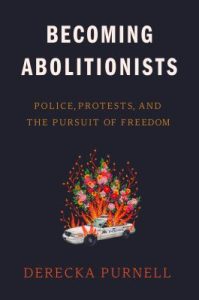 “Purnell details how multi-racial social movements rooted in rebellion, risk-taking, and revolutionary love pushed her and a generation of activists toward abolition. The book travels across geography and time, and offers lessons that activists have learned from Ferguson to South Africa, from Reconstruction to contemporary protests against police shootings. Here, Purnell argues that police can not be reformed and invites readers to envision new systems that work to address the root causes of violence. Becoming Abolitionists shows that abolition is not solely about getting rid of police, but a commitment to create and support different answers to the problem of harm in society, and, most excitingly, an opportunity to reduce and eliminate harm in the first place”
“Purnell details how multi-racial social movements rooted in rebellion, risk-taking, and revolutionary love pushed her and a generation of activists toward abolition. The book travels across geography and time, and offers lessons that activists have learned from Ferguson to South Africa, from Reconstruction to contemporary protests against police shootings. Here, Purnell argues that police can not be reformed and invites readers to envision new systems that work to address the root causes of violence. Becoming Abolitionists shows that abolition is not solely about getting rid of police, but a commitment to create and support different answers to the problem of harm in society, and, most excitingly, an opportunity to reduce and eliminate harm in the first place”
Events in the Library
Our University Library is proud to commemorate the many contributions of African Americans, particularly within education, literature, art, activism, and groundbreaking research and discoveries. We invite you to explore the following programming for Black History Month:
A Conversation with Ayuko Babu
Feb 5, 1:00pm – 2:30pm, University Library: Ferman Presentation Room
Join us for this insightful afternoon in conversation with Ayuko Babu, co-founder and executive director of the Pan African Film Festival (PAFF). Co-sponsored by the Tom & Ethel Bradley Center, University Student Union, Department of Africana Studies, Michael D. Eisner College of Education, and the California Faculty Association.
Working People: Documenting Black Abolitionists’ Lives and Labors
Feb 26, 1:00pm – 2:30pm, University Library: ASRS Viewing Room
Join us for an insightful afternoon with Dr. Marissa Jenrich and CSUN student researchers from the History department, who will be discussing labor and the role of Black abolitionists. Snacks will served.


